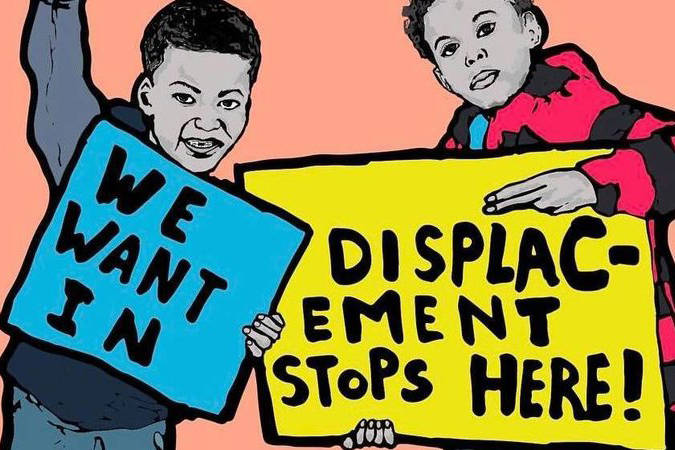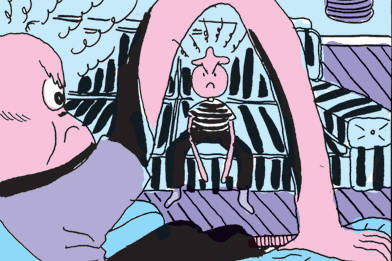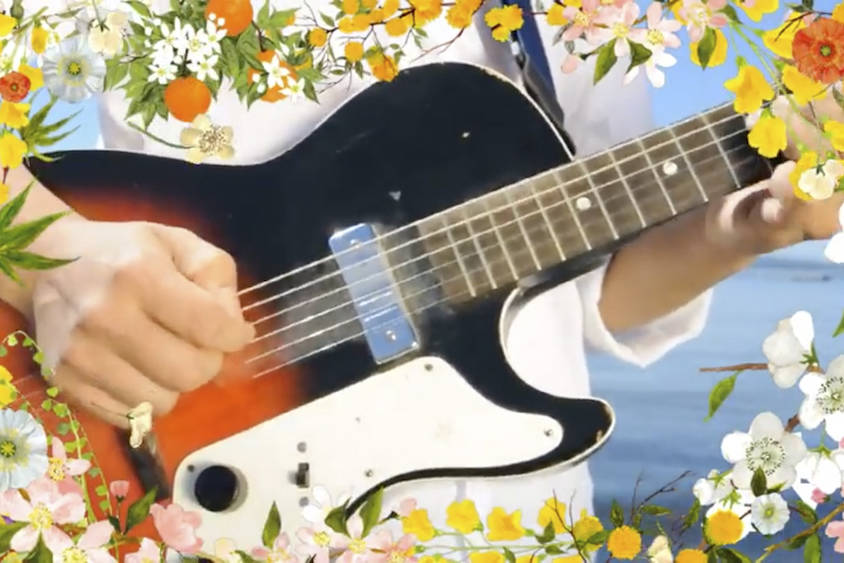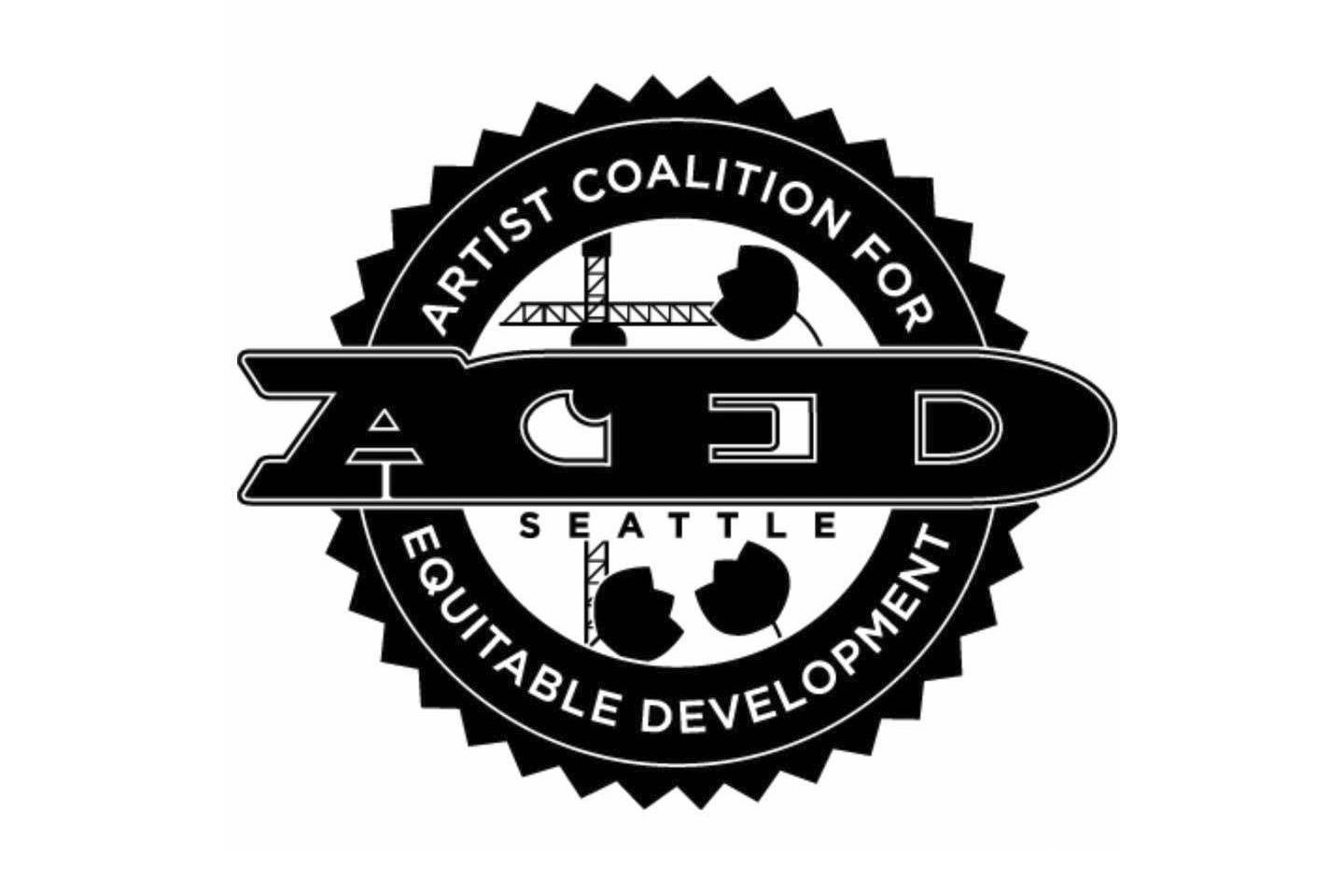Vulcan’s upcoming Upstream Music Festival bills itself as “giv[ing] emerging local artists the resources they need to navigate and thrive in the new music economy.” They hope to do that through a number of artist workshops throughout the festival, as well as one of the most locally focused major festival bills in recent memory—giving local collectives and organizations reign to curate whole stages.
Julie Chang Schulman, a part of the Central District’s hip-hop focused community non-profit 206 Zulu, is performing as a member of her hip-hop group sWordsCool in the festival. Now, she is adding another role to her involvement in Upstream—banding together with a wide swath of community organizations and Upstream artists outside of a formal festival capacity, calling attention to the other side of the “new music economy” Vulcan wants to help artists navigate—the regular economy.
“As artists, particularly with this issue of housing and development, it’s just so clear that all of us are struggling,” Schulman says. “I think that Vulcan and Paul Allen do see themselves as supportive of arts and culture and as philanthropists—good guys as far as the developers go. So we’re giving them the opportunity to really put their money where their mouth is.”
After two months of community input, Schulman and a broad coalition of stakeholders including local artists like Matt “Spek” Watson, DoNormaal, Hollis Wong-Wear and Gifted Gab, mayoral candidate and artist Nikkita Oliver’s newly formed Peoples Party, Nate Omdahl of musicians’ union Fair Trade Music Seattle, Africatown, the Coalition for Inclusive Development and the #WeWantIn movement have published an open letter and petition this morning calling on Upstream to honor four very specific suggestions “for commitments that would truly preserve Seattle art, music and culture.” The suggestions center on Vulcan’s role as the force behind two of the Central District’s major planned development projects—Yesler Terrace and the Promenade at 23rd and Jackson—“that are going to be more transformative than South Lake Union was as far as this city goes,” Schulman says. The suggestions include:
“1. Work with Africatown and a community-nominated stakeholders committee to integrate collective community ownership into Promenade, Yesler Terrace, and future real estate projects via models such as the Liberty Bank MOU and/or the development of community land trusts.
2. Commit to mitigating displacement from all past and current Vulcan development projects by offering permanently affordable housing based on neighborhood median income above and beyond HALA and/or SHA agreements.
3. Commit to offering affordable spaces for music rehearsal, art studios, or culture collaboratives within Vulcan real estate developments with priority access for entities representing vulnerable populations.
4. Build on the work of Musicians Unions and Seattle Music Commission to fund an analysis of music impact data with race and social impact tool/lens to identify clearly who benefits and who is left out of the music economy and strategies for equitable participation.”
For Schulman, the letter is a way to shift the conversation the festival is hoping to have about stimulating Seattle’s musical economy to one about the struggle to simply remain in the city. “The reality is, for a city that prides itself as one of world class art and music, the economic conditions in Seattle are brutal for artists,” the letter reads. “Struggling to survive financially is exhausting, and more of us are being pushed out of the city because we just can’t afford it. Not the rents. Not the rehearsal or studio spaces. Not the cost of living. Not the toxic stress of being broke all the time. Focusing only on how musicians and artists can better monetize our work in the new digital world without examining the context of our city’s basic hostility to anyone who doesn’t earn $100,000 a year isn’t going to make much real progress in preserving a healthy local music culture.”
The petition has already been signed by a large portion of the city’s hip-hop community and many Upstream performing artists, a list the coalition hopes will grow now that the petition has been made public. The goal is to bring the local music industry and the financial forces behind it to the table with the artists and community organizations whose work serves as the industry’s foundation.
Schulman notes that Vulcan has had conversations with community stakeholders, both in the planned Yesler Terrace project and the Promenade, but conversations about community ownership fell out of the discussion. “My understanding from people from the Seattle Housing Authority involved in that, Vulcan kind of just passed the ownership aspect of it to the wayside,” Schulman says. “The thing that I’m worried about I guess, in the Seattle Process, they burn us out. You have people who are compensated for attending these meetings, whereas the community is donating their time. I checked in with the commity who were involved in that Yesler Terrace conversation back in 2007 for years—most everybody out there had since been moved out and everyone was burnt out.”
The coalition is gearing up for a long-term conversation themselves, aiming to bring the community ownership part of the conversation back with these specific suggested commitments. “What we’re starting with this, we’re talking about something like a five-year process,” Schulman says. “We’re talking about community ownership here, this isn’t just a commemorative community mural. Hopefully we’ve asked in a way that Paul Allen and Vulcan will take it on.”
The focus on Central District development emerges from the neighborhood’s historic role as Seattle’s primary hub for music and culture. “There’s a heritage to our artistic practices that we have to be accountable to,” Schulman says. “I would like to see a real directly democratic process of creating a community board that really does have power, and not just have the Central District honored in name by the city as some kind of arts historical district—but to really return some power to the population that has been displaced, and those at risk of becoming displaced from this community that was so crucial to the musical culture of this city because of racism.”
Update: A Vulcan spokesperson tells Seattle Weekly, “We have reached out and are hoping to meet with the artists behind the letter. This conversation requires many stakeholders, including developers. We’re proud of the work we’ve done in starting Upstream and pleased with the positive response from so many musicians and fans.”
The first annual Upstream, a 3-day music festival and summit owned and spearheaded by Seattle real estate mogul and billionaire Paul Allen’s private investment firm Vulcan, will be held May 11-13th in Pioneer Square. The summit is designed to “give emerging local artists the resources they need to navigate and thrive in the new music economy.” However the artist/musician class in Seattle- the one that Vulcan intends to support and invest in- is being economically displaced at a growing pace. In recognition that Vulcan and Paul Allen have the resources and opportunity to set an exciting new precedent for equitable development, we offer the following suggestions for commitments that would truly preserve Seattle art, music, and culture:
1. Work with Africatown and a community-nominatedstakeholders committee to integrate collective community ownership into Promenade, Yesler Terrace, and future real estate projects via models such as the Liberty Bank MOU and/or the development of community land trusts.
2. Commit to mitigating displacement from all past and current Vulcan development projects by offering permanently affordable housing based on neighborhood median income above and beyond HALA and/or SHA agreements.
3. Commit to offering affordable spaces for music rehearsal, art studios, or culture collaboratives within Vulcan real estate developments with priority access for entities representing vulnerable populations.
4. Build on the work of Musicians Unions and Seattle Music Commission to fund an analysis of music impact data with race and social impact tool/lens to identify clearly who benefits and who is left out of the music economy and strategies for equitable participation.
Our Open Letter to Paul Allen and Vulcan Inc.
Dear Paul Allen & Vulcan Inc.,
As Upstream artists and supporters, we first thank you for your efforts toward “giving emerging local artists the resources they need to navigate and thrive in the new music economy” and for the opportunity to participate in this upcoming music festival and summit. Generating livable wages for musicians in Seattle is an important cause. While Seattle’s music industry has grown to an estimated $4.3B in total economic output on the backs of working musicians, we have not shared in these gains. Aiming to improve disparity here is a noble undertaking that reflects what Seattle Times called your “music-nerd roots.”
Art and music, however, are not solely amenities for consumption and leisure, but rather valuable cultural investments for our communities’ futures. They are essential activities of expression, of resistance, of creative dialog that connect us as humans and spark us all to imagine better realities. This is why we are taking our participation in this Vulcan venture as an opportunity to address the urgent need for equitable growth and development- before it’s too late.
The reality is, for a city that prides itself as one of world class art and music, the economic conditions in Seattle are brutal for artists. We are a rapidly gentrifying city, where rental prices are increasing at a rate 4x the national average, and considering that every $100 increase in median rent leads to a 15% increase of the homeless population, it’s no surprise we are currently experiencing a crisis. Struggling to survive financially is exhausting, and more of us are being pushed out of the city because we just can’t afford it. Not the rents. Not the rehearsal or studio spaces. Not the cost of living. Not the toxic stress of being broke all the time. Focusing only on how musicians and artists can better monetize our work in the new digital world without examining the context of our city’s basic hostility to anyone who doesn’t earn $100,000 a year isn’t going to make much real progress in preserving a healthy local music culture.
The intersection of these issues, while initially elusive, become glaring when considering the scale of your two upcoming real estate projects in the historically Black neighborhood of Seattle’s Central District: Yesler Terrace and the Promenade. For well over a decade now, the Black community has been pushed out of the very neighborhood where it gave birth to many cultural movements that grew to fuel the local music economy. African-Americans and the CD have played a major role in the development of Seattle’s musical legacy, yet still have minimal representation/benefit in industry economics. Black venues and events have been targeted and shut down. The economy of Black music is not controlled by and produces minimal benefit to the Black community itself which still suffers from systemic disparity on top of displacement.
Though Vulcan has held meetings and contracted individuals to identify concessions for those concerned about the Promenade, this is only the first step in investing in community vision for thriving in place and mitigating displacement. Your plan to include a small percentage of temporarily “below market value” units, the bare minimum of a city requirement which allows you to collect tax subsidies, is inadequate towards long term affordability as well. We are asking you to dig deeper and codify commitments to these neighborhoods and to the artist/musician communities that are being priced out of them.
You have the opportunity and resources to set a new precedent. Will you emerge as leaders of innovation by pioneering a new era of equitable development? Or will you defer to the superficial tactics of honoring the Central District symbolically without function? We, artists and supporters of Upstream, urge you to make the right decision. If we want art, culture, and music to be vivid elements of our city’s daily life, let’s not put that burden on the artists themselves to innovate and disrupt their way to survival. Let’s establish that art-making is our shared responsibility. Let’s draw a line in the sand now, and commit to keeping space for art makers and musicians. Let’s treat art as essential to examining and understanding and imagining our life here together, not solely as an amenity to consume.
We have tremendous gratitude to you for supporting local music, creating space to shed light on issues impacting artists, and bringing in some of the best and brightest among us to inform the conversation. We hope you and Vulcan will take this statement and endorsements of it as an opportunity to broaden this exploration of inventing a future where artists can not only survive but thrive.
Sincerely,
Upstream Artist Coalition for Equitable Development
***
Individual Supporters:
Aaron Dixon
Acacia (Acacia the Queen) Porter
Adrian “Sagenomad” Shaw
Adrienne La Faye
Alex Huynh
Alexander (Fantasy A) Hubbard
Alden Lightning
Amir Islam
Amy L. Piñon.
Andrew Savoie
Anelise Moon
Anna Ludwig
Ashraf Hasham
Astro King Phoenix
Ayan Musse
Bana Abera
Caleb Talbert (Luna God)
Carter Wilson
Camille McGinnis
Chance Christopher Crafton (Ancient Mariner)
Chimaera of Groundswell Arts Collective
Chimaroke Abuachi
Christianne (Donormaal) Karefa-Johnson
Christopher (Zen Seizure) Williams
Chrystal Sweet
Davida Ingram
Dax Anderson
Danae Harrison-Corey
Dex Amora
Edwin Lindo
Estrella Murray
Gabriel Teodros
Geneiva Arunga (Dadabassed)
Geo (Geologic) Quibuyen
Gabrielle (Gifted Gab) Kadushin
Haj Jones
Hanna Gebre
Hollis Wong-Wear
IFTHEN
J’Sawes of the BLEAU
Jaclyn Mena
Jacob Espina-Galfano
Jamil Suleman
Janice Ibarra
Jarv Dee
Jazmyn Scott
Jeff Dulaney
Jerrell Davis
Jesse Call
Julie Chang Schulman
John Fisher
Joseph SCRiBE Cabey
Joshua Thomas
KL Shanon
Kadence Arelle Mercy
Karen Toering
Keosha (Lovely) Fredricks
Kirt Debique
Klopfenpop
Lace Cadence
Larry Mizell Jr.
Luzviminda Carpenter
Macedonia Dash López
Maimoona Rahim
Makie Matsumoto-Hervol
Malik Clinton
Mario Sweet
Matt (Spekulation) Watson
Matthew Slone Cherkasky
Nate Omdal
Nathanael Mengist
Nikki Etienne
Nikkita “KO” Oliver
Njuguna Gishuru
Olisa Enrico
Olivia Hatfield (Guayaba)
Poesia MariArte
Rashuad Johnoson
Raven Matthews
Rob Granfelt
Robby Snow Araless
Ronald (Ready Ron) Wilson
Satpreet Kahlon
Simon Wolf
Stas thee Boss
Steelo Brown
Steven Davis
Suntonio Bandanaz
Talena Lachelle Queen
Taylor Elizza Beth
Tim Basaraba (TBASA)
Vaughn
Whitney Monge
Wyking Garrett
Yirim Seck
Zach Claflin (Hekl the Mad Scientist)
Organizations/Crews/Collective Supporters:
69/50 Collective
African Youth United
Alpha P
Arunga Music LLC
Beat Tape Bandits
Black Magic Noize
Coalition for Inclusive Development
Crowd Control Collective
Downstream
Emerald Empire
Filthy Fingers United
Her Best Self
Indie Genius Media
Northwest Fortress
Pacific Rim Solidarity Network
Peace & Red Velvet
Pound of Fresh
Remember Face
Rhyme & Reason
Seattle Fair Trade Music
Seattle Musicians Association Local 76-49
Shades’O Silence
Stay Happy Collective
Substation
sWordsCool
The Collective Gathering
The INC.
The Seattle Peoples Party
Vanishing Seattle
Women.Weed.WIFI.
xolo coyotl








